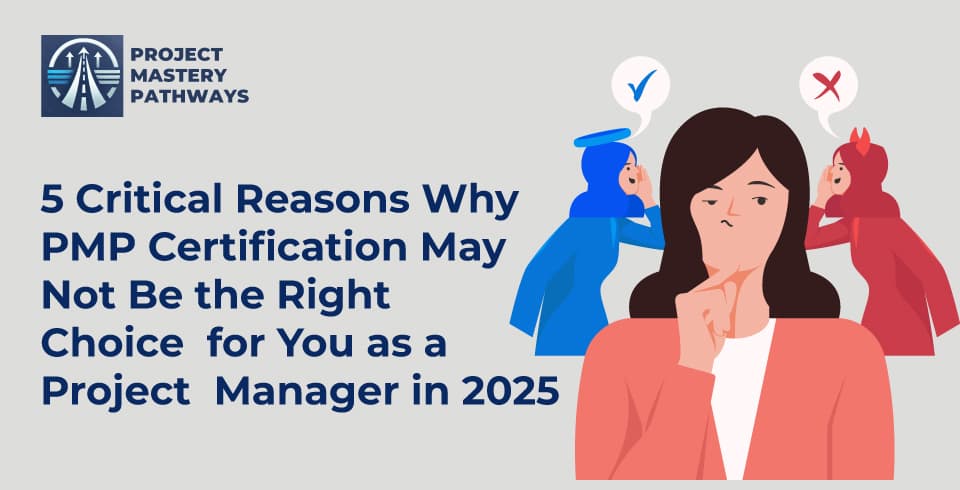You’ve been researching the PMP certification for weeks now. Everyone seems to be talking about its incredible benefits—higher salaries, global recognition, and career advancement. But here’s what nobody’s telling you: the PMP certification isn’t for everyone. Despite all the hype surrounding this prestigious credential, pursuing it could be the wrong move for your specific career situation, potentially costing you thousands of dollars and hundreds of hours with minimal return on investment.
If you’re feeling uncertain about whether the PMP is right for you, you’re not alone. This blog will give you an honest, balanced perspective on when the PMP certification might not be your best option. By understanding these critical considerations, you’ll save yourself from making a costly mistake and discover alternative paths that might serve your career goals better.
The Financial and Time Investment May Not Justify Your Returns
Let’s talk about the elephant in the room—the substantial investment required to earn your PMP certification. The total cost for PMP exam preparation and certification ranges between $1,000 to $4,000, which includes the certification exam cost of $405 for PMI members (plus $139 annual membership), training costs between $200 to $3,500 depending on location and format, and study materials costing $100 to $200.
But money isn’t your only investment. The PMP exam requires significant memorization and study time, with many candidates taking several days off from work to prepare adequately. For aspiring project managers just starting their careers or those working in small companies without professional development budgets, this financial burden can be overwhelming.
If you fail the exam on your first attempt, PMI charges a re-examination fee of $275, and if you need to reschedule your exam, that costs an additional $70. These costs add up quickly, especially if you’re self-funding your certification journey. Before committing to the PMP, honestly assess whether your current career stage and financial situation can support this investment—particularly if you’re uncertain whether project management is your long-term career path.
You Work in Agile Environments, Startups, or Modern Tech Companies
Here’s a crucial truth that many aspiring project managers overlook: if you’re working at new-age startups and tech organizations, the methodology that the PMP teaches isn’t particularly relevant in these organizations, and the PMP certification would likely not benefit you in this environment.
Modern software development companies, digital agencies, and tech startups overwhelmingly favor Agile methodologies like Scrum, Kanban, and Lean approaches over the traditional project management frameworks emphasized in PMP certification. Traditional industries like construction and healthcare prefer PMP for its comprehensive approach, while technology companies and startups prefer certifications like Certified Scrum Master (CSM) for Agile expertise.
If your career aspirations lie in fast-paced, innovation-driven environments where flexibility and rapid iteration are valued over detailed planning and control, you’d be better served by pursuing Agile-specific certifications. Consider alternatives like the Certified Scrum Master (CSM), PMI Agile Certified Practitioner (PMI-ACP), or SAFe certifications (learn more about these options in my guide to the PMI-ACP certification). These credentials are more aligned with how modern tech companies actually operate and what hiring managers in these industries actively seek.
You’re Early in Your Career Without Sufficient Experience
One of the biggest mistakes aspiring project managers make is rushing to pursue the PMP certification before they’re truly ready. The PMP has stringent eligibility requirements that many newcomers to project management simply cannot meet. You need either 36 months of project management experience with a four-year degree or 60 months with a high school diploma, plus 35 hours of project management education.
For fresh graduates, entry-level professionals, or career changers, the Certified Associate in Project Management (CAPM) certification is specifically designed as an entry-level credential that requires no prior project management experience. The CAPM provides the foundational knowledge you need without the experience barrier, making it far more accessible and practical for those starting their project management journey.
According to recent data, the average US salary for CAPM holders is $74,000 as of January 2025, while PMP holders earn $118,000. While the PMP salary is higher, the CAPM still represents a significant salary increase for entry-level professionals compared to non-certified positions. More importantly, pursuing CAPM first allows you to gain the experience you need while earning a respectable salary, then transition to PMP when you’re truly qualified. For a detailed comparison, check out my article on why CAPM might be a better choice for you.
Certification Doesn’t Guarantee Practical Skills or Better Project Management
Here’s an uncomfortable truth about professional certifications: passing the PMP exam doesn’t guarantee that you’re a great project manager and doesn’t really display that you have actual knowledge—PMP can’t transform a bad project manager into a good one or a good project manager into a better one. This is particularly relevant for aspiring project managers who might believe that earning the PMP will automatically make them competent leaders.

Some critics argue that PMP certification does not necessarily translate to real-world project management skills—while the certification covers theoretical knowledge, practical experience remains crucial for effective project management. The PMP exam tests your knowledge of frameworks, processes, and terminology found in the PMBOK Guide, but managing actual projects requires soft skills like emotional intelligence, stakeholder management, conflict resolution, and adaptive thinking that no exam can fully measure.
Real-world experience is far more valuable than any certificate and cannot be replaced by it. If you’re choosing between gaining hands-on project experience and spending months studying for the PMP, consider that employers often prioritize demonstrated success in managing projects over credentials alone. The certification should complement your experience, not substitute for it.
Ongoing Maintenance Requirements and Alternative Credentials May Better Suit Your Goals
Many aspiring project managers don’t realize that earning the PMP is just the beginning of an ongoing commitment. To maintain your certification, you must earn 60 Professional Development Units (PDUs) every three years, which requires continuous education, attending conferences, or contributing to the project management profession. This ongoing requirement demands both time and often additional financial investment.
PMP is acclaimed by global leaders in project management, but Europe and the UK often prefer PRINCE2 over PMP, and various countries don’t have a strong preference for either certification. If you’re planning to work in Europe, pursuing PRINCE2 certification might offer better recognition and career opportunities in that region.
Additionally, depending on your industry focus, specialized certifications might serve you better than a general PMP credential. For those in IT, consider exploring IT certifications for project management. For construction professionals, review construction project management certifications. These specialized credentials often carry more weight in their respective industries than a general project management certification.
Make the Right Certification Decision for Your Unique Career Path
The PMP certification is undoubtedly valuable for many project managers, but it’s not a one-size-fits-all solution. Understanding when the PMP may not be the right choice is just as important as knowing its benefits. Whether you’re working in Agile environments, early in your career, constrained by budget, or pursuing work in specific regions or industries, alternative certifications might better serve your professional goals.
The key to success in project management isn’t just collecting credentials—it’s choosing the right certifications that align with your career stage, industry focus, and professional aspirations. Before committing to the PMP journey, take time to honestly assess your situation against the factors discussed in this article.
Want to explore which project management certification is truly right for you? Check out my comprehensive guide on which certification is best for project management, or discover the best certifications for beginner project managers. For personalized guidance and insights on navigating your project management certification journey, subscribe to PMPwithRay for expert advice, or enroll in my specialized project management courses on Udemy designed to help you make informed career decisions and choose the certification path that’s right for you.

